From the very beginning of Episode 2: A New Era To Re-Define Sustainable Life of Dassault Systèmes Science in the Age of Experience virtual event, it was clear that we would see something very special, with speakers presenting their highly personal endeavors to make life better and more sustainable.
Register now to watch Episode 2 for the first time, or log in through your personal link to watch again.
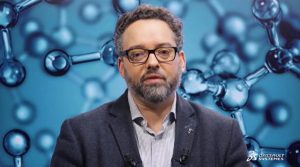
Hosted by Patrick Johnson, Sciences & Corporate Research, Senior Vice-President, Dassault Systèmes, the program featured Dr. David Hoganson, Boston’s Children’s Hospital and Harvard Medical School, whose clinical focus is newborn infants and children with congenital heart disease needing surgery; Dr. Eytan Abraham who heads Lonza Personalized Medicine focusing on personalized cell and gene therapies; and Dr. David Fajgenbaum, leading the Castleman Disease Research Program at the University of Pennsylvania, who is fighting Castleman disease himself, and has revolutionized how this “orphan” disease is researched and treated.
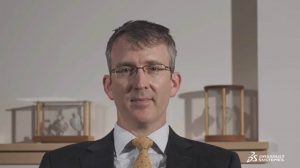
Dr. Hoganson started the session describing that repairing congenital heart disease is fundamentally a physics problem. “We’ve put together an engineering team that utilizes proven modeling and simulation tools for industry,” he said, “to really change the paradigm on how congenital heart defects are visualized, the procedures are planned, and operations are conducted.”
One case he described had a patient having a large diameter difference where the right atrium connected with the pulmonary artery. The challenge to create a smooth connection with minimal energy loss.
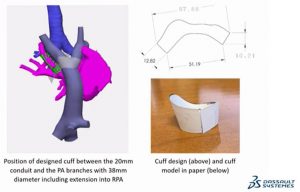
“Our approach was to design a transition from a 20mm vascular graft from the interior vena cave to a 40mm opening in the pulmonary artery,” explained Dr. Hoganson. “As engineers, we looked at this cup design and found it a reasonable and good solution. . . We used the platform to design the shape of the cuff and perform the unfolding of the cuff to a flat shape, a 2D shape, used in the operating room to create this from a flat patch of material. The patient underwent this high-risk operation, the assembly of the cuff went very well, and the patient has had a very good outcome.”
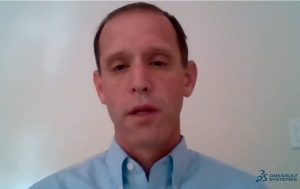
Next on the program was Dr. Eytan Abraham who focuses on personalized cell and gene therapies at Lonza Personalized Medicine. Over 500 companies worldwide are developing over 1,300 products using cell & gene therapy. Several therapies have already been approved, but cost from about $400,000 to almost $900,000. The question is if we can reduce the costs and make them more available.
Dr. Abraham gave a detailed summary of the processes and challenges for producing these therapies. The processes, supply chains and manufacturing are complex. Production challenges for the modalities of curative therapies – allogeneic and autologous – are similar: trained workers, clean-room space, and manufacturing quality control software. But in terms of process scaling, it is a matter of scaling up for allogeneic (producing therapeutics from donor cells for the widest population) and scaling out for the autologous (producing individualized therapies).
“We need to meet manufacturing challenges by developing fit-for-purpose novel platforms that are closed, automated and flexible enough to allow for different types of manufacturing processes,” said Dr. Abraham. You can access his full presentation by registering now to watch Episode 2 for the first time, or logging in through your personal link to the event.
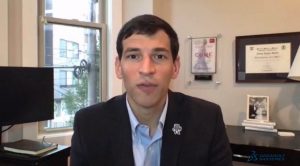
The final presenter was Dr. David Fajgenbaum who has Castleman disease, giving him a very personal connection to his research. He leads the Castleman Disease Research Program at the University of Pennsylvania, and has transformed the way the disease is researched and treated.
Castleman is a rare and deadly condition where the immune system attacks and shuts down the body’s vital organs. It is not known whether to classify it as a cancer or an autoimmune disorder, and its cause is unknown. After almost dying, Dr. Fajgenbaum began his quest to find effective treatments to keep himself and others alive, and perhaps cure the disease. In his presentation, he describes his research, experimenting with already existing drugs, and utilizing METADATA to identify potential solutions.
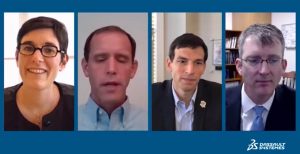
The episode concluded with Claire Biot, Vice President, Life Sciences industry at Dassault Systèmes, leading an online panel with all the presenters. Dr. Fajgenbaum pointed out that there are 3,000 compounds already approved by the U.S. Food & Drug Administration (FDA), and if we could match those, which are often generic, together with patient conditions, we could help save lives and costs. Dr. Abraham pointed out that methods of manufacturing are lagging, but we can overcome that with new manufacturing solutions combining engineering and biology in a multidisciplinary fashion. Dr. Hoganson observed that traditional pathways no loner apply – we need different perspectives with multi-disciplinary applications, cross-training, and adaptation.
You can watch the full panel discussion and all the presentations from EPISODE 2: A NEW ERA TO RE-DEFINE SUSTAINABLE LIFE by registering now to get access. If you already registered for the event, you can watch it again using your access link.
Watch for our next recap coming for
EPISODE 3: SCIENCE TAKES MANUFACTURING TO NEW LEVELS – on the new path to smarter, safer and more efficient production with a focus on circular economy and recycling
and REGISTER NOW for
EPISODE 4: TOMORROW’S SUSTAINABLE CITIES, TUESDAY, NOVEMBER 10, 2020 – making cities sustainable and citizen-focused in the face of growing challenges – environment, natural disasters, mobility, public health and safety.

